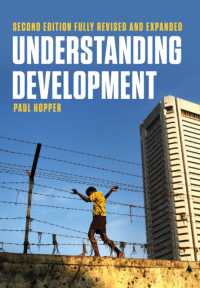Full Description
Psychiatry after Kraepelin: Ambition, Images, Practices 1926-2026 brings together an outstanding group of contributors to reflect on the centenary of Emil Kraepelin's death—one of the most influential figures in shaping psychiatry's medical identity. Moving both through and beyond Kraepelin's legacy, the volume is grounded in an understanding of psychiatry as a field that is not only medical, but also deeply social and personal in nature.
This is an Open Access book. Spanning a wide methodological, geographical, and chronological range, the chapters draw on insights from multiple disciplines and the lived experiences of mental health service users. Together, they illuminate both some key scientific and clinical advances in psychiatry and some profound—and at times catastrophic—failings that have marked its history. Embracing a pluralism of perspectives, this timely volume offers critical reflections and constructive insights for addressing some of the most pressing challenges facing mental health care in an increasingly conflicted world.
Psychiatry after Kraepelin is an essential text for current and aspiring psychiatrists; a resource not just for the personal library but also to trigger vital discussions in clinical and educational supervision and journal clubs worldwide. Subodh Dave Dean, Royal College of Psychiatrists, Professor of Psychiatry, University of Greater Manchester
Psychiatry after Kraepelin is a thoughtful, clever, and intelligently compiled handbook on the path dependencies that have shaped psychiatry. The editors' modest description of the book as a "montage" does not do justice to its significance. Rather, it is a valuable resource that offers insights into the historical and philosophical contexts that have influenced current perspectives on psychiatry, with both positive and negative effects on humanity, mental health and public health." Heiner Fangerau Professor and Head of Department of History, Philosophy and Ethics of Medicine, Heinrich-Heine-Universität Düsseldorf.
Contents
Advance Reviews.- Table of Contents.- Acknowledgments.- Author biographies of all authors.- Foreword: Emil Kraepelin and his legacy.- Introduction: Psychiatry after Kraepelin and beyond.- Part A- Emil Kraepelin.- 1. Emil Kraepelin, Wilhelm Wundt and Leipzig University: Short-term stay, long-term impact.- 2. Kraepelin and the development of Physical Treatments in Psychiatry.- 3. Beyond conceptual history: Emil Kraepelin's, Karl Jaspers' and Arthur Kronfeld's views on psychiatry may not only inform, but also guide our present-day debate.- Part B- After Darwin: Biology in the Evolution of Psychiatry.- 4. Degeneration and eugenics.- 5. Evolutionary Psychiatry before, during and after Kraepelin and his times.- 6. A Genetic Perspective on Kraepelin's Nosology.- 7. Brain imaging in schizophrenia.- Part C- Psychiatric Diagnosis: Concepts and Challenges.- 8. From Dementia Praecox to Autoimmune Psychosis Diagnostic challenges of the schizophrenias.- 9. The origins of invention and its link with autism.- 10. Political Ideology, Collective Emotions and Diagnosis in Psychiatry.- 11. The Continental Philosophical Psychiatric Tradition and the Dialectics of Madness.- 12. Mad People and Mad Studies.- Part D- Image, Imagination and Experience.- 13. Adverse Childhood Experiences and Brain Development.- 14. Imagi(ni)ng the brain in psychiatry.- 15. The self in neuroscience and psychiatry.- 16. Images for psychiatry: from the conceptual description of symptoms and "Clinical forms", through the search for structural units of meaningful "Forms of life", to images as "Forms of Pathos".- 17. "Sheer space", "Elvenspace", the Ghost Choir of time and "Thymic space": A Trilogue to Understand Space "Oddities" in Schizophrenia.- Part E- Mental Health Services: Reality and Ambition.- 18. Emil Kraepelin's Influence in India.- 19. Soviet Psychiatry: the Stalin Years.- 20. Yugoslav Psychiatry in the Middle: Non-aligned and Post-Colonial Psychiatry during the Cold War.- 21. Ideas, Theories and Psychiatric Services: De-institutionalisation and Community Care in Italy, the UK and Germany since 1960.- 22. Latin American Psychiatry Reform and the WHO Mental Health Office.- Part F- Psychiatry and Mental Health Services Today and Tomorrow.- 23. Emil Kraepelin and Biological Research in Psychiatry Today.- 24. What does research tell us about peer support, its strengths, and potential risks?.- 25. Beyond Kraepelin: An Aetiological Approach to the Typology and Treatment of Psychosis.- 26. The Best Psychiatry in the World? Ambition and Achievement in Denmark.- 27. Doing Justice: Psychiatry as a Vocation.- Afterword.







